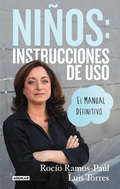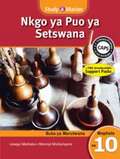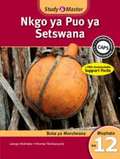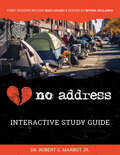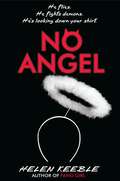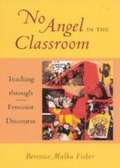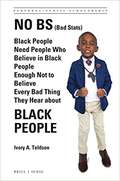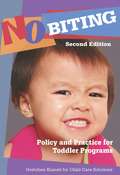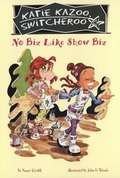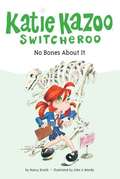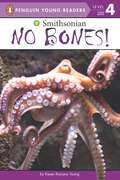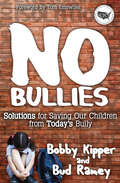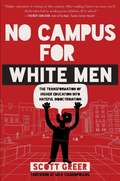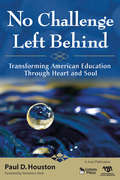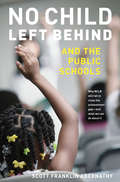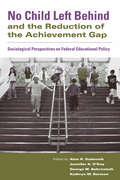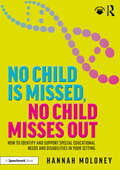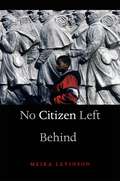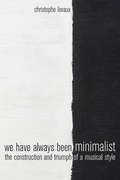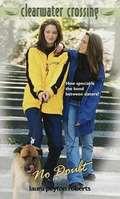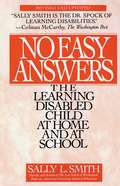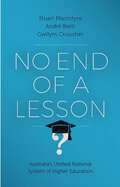- Table View
- List View
Niños: instrucciones de uso. El manual definitivo
by Rocío Ramos-Paúl Luis Torres¿Estamos preparados para ser padres?El libro completo para la educación de tus hijos. Es una pregunta clásica a la hora de enfrentarnos al hecho de tener un hijo. Algo que en principio tendría que ser un instinto natural resulta mucho más difícil de lo que se pueda pensar, y más aún hoy en día, cuando el tiempo que dedicamos a nuestros hijos a veces puede parecer insuficiente o poco valioso. En este contexto, la psicóloga más querida de la televisión, Rocío Ramos-Paúl, y Luis Torres han confeccionado este manual en el que no solo se aglutinan todas y cada una de las enseñanzas y técnicas que Rocío utiliza en su programa, sino que se explican de manera detallada los principales procesos y problemáticas de los pequeños según su rango de edad. Los niños vienen sin instrucciones de uso, pero Rocío Ramos-Paúl y Luis Torres han confeccionado un estupendo prospecto con el cual podrás afrontar la educación de tus hijos de una forma serena y feliz. Este libro te ayudará a educar a tu hijo en distintos ámbitos: * Hábitos * Límites * Tiempo de calidad * Entorno * Escolarización
Nkgo Ya Puo Ya Setswana Mophato wa 10 Buka ya Morutwana: UBC Contracted
by Lesego Mahlabe Ntompi MoikanyaneStudy & Master Nkgo ya Puo ya Setswana ke metseletsele ya dibuka tse di kwaletsweng barutabana le barutwana ba Setswana mo Sekgamung sa Dithuto tse Dikgolwane (FET). Dibuka tse, di kwadilwe ka maitemogelo le bokgoni go arabela ditlhokego tsa meetlo, melawana, diteng le dikgono tse solofelwang ke Pegelo ya Pholisi ya Bosetšhaba ya Kharikhulamo le Tlhatlhobo. Buka ya Morutwana • E humile ka ditirwana tse di rotloetsang morutwana go akanya le go tsosolosa kgatlhego ya go itse, go dirisa le go ikgantsha ka puo ya Setswana. • E na le kitsokakaretso e e rulagantsweng ka botswerere go ruta ngwao le setso, go aga botho jo bo feletseng jwa ngwana wa mmala wa sebilo. • E humile thutapuo go tlhokotsa tirisopuo e e lolameng. • Ditlhangwa di tlhophilwe sentle go lebeletswe ditiragalo tsa maloba le tsa sešeng. • E humile ka dikao tsa ditlhatlhobo le mefuta mengwe ya ditekanyetso go ya ka Lenaane la Tekanyetso. Buka ya Morutabana • E rulagantswe ka matsetseleko go kgontsha morutabana go fitlhelela diteng tse di maleba bonolo. • E humile ka dikarabo tse di tshitshintsweng, diruboriki le ditsibogelo tse dingwe tse di maleba tsa ditirwana ka kakaretso. • E kaela morutabana kgato ka kgato ka fa dithuto di ka tsamaisiwang ka gone. • E thusa morutabana go busetsa boleng jwa ngwana wa Motswana ka go mo ruta meetlo, ngwao le setso. • Ke letlhomeso le morutabana a ka agelelang dithuto le ditirwana tse dingwe tse di etleetsang dikgono tsa go reetsa le go bua, go buisa le go lebelela, go kwala le go tlhagisa go tsenyeleditswe thutapuo ka matsetseleko.
Nkgo Ya Puo Ya Setswana Mophato wa 10 Buka ya Morutwana: UBC Uncontracted
by Lesego Mahlabe Ntompi MoikanyaneStudy & Master Nkgo ya Puo ya Setswana ke metseletsele ya dibuka tse di kwaletsweng barutabana le barutwana ba Setswana mo Sekgamung sa Dithuto tse Dikgolwane (FET). Dibuka tse, di kwadilwe ka maitemogelo le bokgoni go arabela ditlhokego tsa meetlo, melawana, diteng le dikgono tse solofelwang ke Pegelo ya Pholisi ya Bosetšhaba ya Kharikhulamo le Tlhatlhobo. Buka ya Morutwana • E humile ka ditirwana tse di rotloetsang morutwana go akanya le go tsosolosa kgatlhego ya go itse, go dirisa le go ikgantsha ka puo ya Setswana. • E na le kitsokakaretso e e rulagantsweng ka botswerere go ruta ngwao le setso, go aga botho jo bo feletseng jwa ngwana wa mmala wa sebilo. • E humile thutapuo go tlhokotsa tirisopuo e e lolameng. • Ditlhangwa di tlhophilwe sentle go lebeletswe ditiragalo tsa maloba le tsa sešeng. • E humile ka dikao tsa ditlhatlhobo le mefuta mengwe ya ditekanyetso go ya ka Lenaane la Tekanyetso. Buka ya Morutabana • E rulagantswe ka matsetseleko go kgontsha morutabana go fitlhelela diteng tse di maleba bonolo. • E humile ka dikarabo tse di tshitshintsweng, diruboriki le ditsibogelo tse dingwe tse di maleba tsa ditirwana ka kakaretso. • E kaela morutabana kgato ka kgato ka fa dithuto di ka tsamaisiwang ka gone. • E thusa morutabana go busetsa boleng jwa ngwana wa Motswana ka go mo ruta meetlo, ngwao le setso. • Ke letlhomeso le morutabana a ka agelelang dithuto le ditirwana tse dingwe tse di etleetsang dikgono tsa go reetsa le go bua, go buisa le go lebelela, go kwala le go tlhagisa go tsenyeleditswe thutapuo ka matsetseleko.
Nkgo ya Puo ya Setswana Buka ya Morutwana Mophato wa 12: UBC contracted (Caps Setswana Ser.)
by Lesego Mahlabe Ntompi MoikanyaneLesego Mohlabe ke modiredipuso kwa Lefapheng la Thuto kwa Bokone Bophirima. Ka maemo ke Deputy Chief Education Specialist (DCES) mo Lekaleng la Ditlhatlhobo a dira jaaka mogokaganyimogolwane wa School Based Assessment (SBA) mo porofenseng. Tiro ya gagwe ke go netefatsa gore barutwana ba Mophato wa 10-12 ba baakanyediwa go tlhagisa phitlhelelo e e maleba mo dirutweng tsotlhe. Ntompi Moilanyane e ne e le morutabana wa Setswana le Thutalefatshe kwa Tebogwana Secondary School kwa porofenseng ya Gauteng. Gajaana ke Tlhogo ya Lefapha (HOD) kwa Bethesda Special School a dira jaaka School Based Support Team Coordinator. Bakwadi ka bobedi ke Batswana ka tsalo e bile ba godisitswe ka molao wa Setswana. Ba setse ba tlhagisitse dikwalo di le mmalwa mmogo, ka puo ya batho.
Nkgo ya Puo ya Setswana Buka ya Morutwana Mophato wa 12: UBC uncontracted (Caps Setswana Ser.)
by Lesego Mahlabe Ntompi MoikanyaneLesego Mohlabe ke modiredipuso kwa Lefapheng la Thuto kwa Bokone Bophirima. Ka maemo ke Deputy Chief Education Specialist (DCES) mo Lekaleng la Ditlhatlhobo a dira jaaka mogokaganyimogolwane wa School Based Assessment (SBA) mo porofenseng. Tiro ya gagwe ke go netefatsa gore barutwana ba Mophato wa 10-12 ba baakanyediwa go tlhagisa phitlhelelo e e maleba mo dirutweng tsotlhe. Ntompi Moilanyane e ne e le morutabana wa Setswana le Thutalefatshe kwa Tebogwana Secondary School kwa porofenseng ya Gauteng. Gajaana ke Tlhogo ya Lefapha (HOD) kwa Bethesda Special School a dira jaaka School Based Support Team Coordinator. Bakwadi ka bobedi ke Batswana ka tsalo e bile ba godisitswe ka molao wa Setswana. Ba setse ba tlhagisitse dikwalo di le mmalwa mmogo, ka puo ya batho.
Nko ga e dupe: UBC contracted
by M. M ItumelengGo botlhokwa gore barutwana ba buise le go tlhaloganya diponagalo tsa padi pele ba ka simiolola go buisa padi. Maikaelelo ke go ruta barutwana ka ga diponagalo tse di tla ba thusang go sekaseka padi nngwe le nngwe ka tsenelelo
No Address: An Interactive Study Guide
by Dr. Robert G. Marbut Jr.A four-session interactive Bible study, based on the documentary Americans with No Address, that examines the biblical response to people experiencing homelessness. Homelessness is not an &“issue&”; it&’s an opportunity for the church to love our neighbors. In this four-session interactive Bible study, we examine what Scripture has to say on the topic. A companion to the documentary Americans with No Address and the full-length theatrical movie No Address (starring Ashanti, William Baldwin, Beverly D&’Angelo, and Xander Berkeley), this study teaches participants: The root causes of different types of homelessness. How to engage rather than enable. The importance of collaboration among existing agencies. How to mobilize their church to follow Jesus&’ call to serve. Each session includes: Facts, true stories, and background about the people who experience homelessness in America. QR code for quick link to online videos. Discussion questions for churches and small groups. Perspective from the Bible. &“Go and Do&” action steps. Ideas for further resources. Prayer prompts and reflection questions. The government can&’t solve homelessness alone. The nonprofit sector can&’t solve it alone. But neighbors loving neighbors, working together, can make a difference for the people who are experiencing homelessness in America. No Address equips Christians to lead the way.
No Angel
by Helen KeebleMix the wry humor of Vladimir Tod, the relatability and fun of Ally Carter, and a sinfully hilarious setup, and you have No Angel--an unforgettable spin on angels and demons from the author of Fang Girl. Rafael Angelos just got handed the greatest gift any teenage boy could ever dream of. Upon arriving at his new boarding school for his senior year, he discovered that he is the only male student there. But Raffis about to learn that St. Marys is actually a hub for demons--and that he was summoned to the school by someone expecting him to save the day. Raffi knows hes no angel--but its pretty hard to deny that theres some higher plan at work when he wakes up one morning to discover hes sprouted wings and a glowing circle around his head. . . .
No Angel in the Classroom: Teaching Through Feminist Discourse
by Berenice Malka FisherNo Angel in the Classroom: Teaching through Feminist Discourse presents a theoretically complex yet down-to-earth and personal account of feminist teaching in higher education. Starting with a nuanced interpretation of consciousness-raising, longtime feminist educator Berenice Malka Fisher develops her philosophy of feminist teaching as a form of political discourse. Through reflection on a series of candid classroom stories, she analyzes knotty problems faced by academics and activists. What counts as knowledge in discussion of feminist issues? Can teachers exercise authority without being authoritarian? What is the role of caring in political deliberation? Should safety be considered when students and teachers address volatile topics? How can feminist and other teachers committed to social justice give serious attention to the intersections of gender, race, and sexual orientation? This groundbreaking book is intended for the beginning and veteran teachers and others concerned with the contribution of education to extending social justice. Fisher's work offers a pedagogical vision that inspires both passion and critical thinking.
No BS: Black People Need People Who Believe in Black People Enough Not to Believe Every Bad Thing They Hear About Black People (Personal/Public Scholarship #4)
by Ivory A. ToldsonWhat if everything you thought you knew about Black people generally, and educating Black children specifically, was based on BS (bad stats)? We often hear things like, "Black boys are a dying breed," "There are more Black men in prison than college," "Black children fail because single mothers raise them," and "Black students don't read." In No BS, Ivory A. Toldson uses data analysis, anecdotes, and powerful commentary to dispel common myths and challenge conventional beliefs about educating Black children. With provocative, engaging, and at times humorous prose, Toldson teaches educators, parents, advocates, and students how to avoid BS, raise expectations, and create an educational agenda for Black children that is based on good data, thoughtful analysis, and compassion. No BS helps people understand why Black people need people who believe in Black people enough not to believe every bad thing they hear about Black people.
No Biting: Policy and Practice for Toddler Programs, Second Edition
by Gretchen KinnellBiting is one of the most frustrating and widespread issues childcare providers and parents face.No Biting discusses why toddlers bite, how to respond to biting, and how to develop a plan to address repeated biting.<P><P> It also explores what parents think of biting, how to respond to their suggestions and demands, and how to create biting policies. This second edition includes additional anti-biting strategies, new information on the causes of biting, and sample newsletter articles to educate parents.
No Biz Like Show Biz (Katie Kazoo Switcheroo #24)
by Nancy KrulikWhen Miriam gets Suzanne's role in the school play, Katie knows there will be trouble. But she certainly doesn't plan on being involved in it! Unfortunately, the magic wind has plans of its own it turns Katie into Miriam just before the show!
No Bones About It (Katie Kazoo Switcheroo #12)
by Nancy KrulikThe class 3A trip to the Natural History Museum is turning out to be a disaster: Many of Katie's excited classmates are acting up, and they turn on Katie and call her a goodie-goodie when she won't join in!
No Bones! (Smithsonian)
by Karen Romano YoungWho needs bones to swim the seven seas? Learn all about marine invertebrates, the ocean's amazing boneless animals in this cool Smithsonian reader.Octopuses, clams, sea worms, even coral: they're all marine invertebrates. Having no internal skeleton gives them an interesting shape—not to mention unusual ways of moving around, getting food, and protecting themselves. Fascinating underwater photography and lively, accessible text draw kids into the watery world of these cool ocean creatures.
No Bullies: Solutions for Saving Our Children from Today's Bully
by Bobby Kipper Bud RameyPractical solutions to stop the culture of bullying. We&’ve all seen bullies in action. Many of us have been the victims. Some of us have been the perpetrator. But thanks to all the attention being focused on bullies and the issues that surround them, awareness is growing of the damage bullying can do. Whether we&’re raising children in this culture or we&’re part of the village that helps, we also need some effective and user-friendly tools to go up against the bully. We need some very specific and action-oriented strategies to help every child feel welcomed and valued. This book offers a smart, useful guide for parents, teachers, counselors, and anyone who cares about putting an end to abusive behavior.
No Campus for White Men: The Transformation of Higher Education Into Hateful Indoctrination
by Milo Yiannopoulos Scott GreerNo Campus for White Men shines a bright light on the growing obsession with diversity, victimization and identity politics on today's college campuses, and shows how it is creating an intensely hostile and fearful atmosphere that can only lead, ultimately, to ever greater polarization in American society. Across the country, ugly campus protests over speakers with dissenting viewpoints, as well as a preoccupation with "micro-aggressions," "trigger warnings," "safe spaces" and brand-new "gender identities," make it obvious that something has gone terribly wrong with higher education. For years, colleges have pursued policies favoring students based not on their merit, but on their race, gender, and sexual orientation. The disturbingly negative effects of this culture are now impossible to deny. Scott Greer's investigative work links such seemingly unrelated trends as "rape culture" hysteria and Black Lives Matter to an overall campus mindset intent on elevating and celebrating leftist-designated "protected classes" above everyone else - while intimidating, censoring, and punishing those who disagree with this perversely un-American agenda. In No Campus for White Men, Greer broadens the usual media focus well beyond coverage of demonstrations by easily offended college students, to spotlight the darker forces at work behind the scenes that are feeding higher education's metastasizing crisis - and how all this results in sustained animosity, first and foremost, toward white men. Greer also documents how this starkly totalitarian culture is not isolated to higher education, but is rather a result of trends already operating in society. Thus, he shows, today's campus madness may eventually dominate much more of America if it is not addressed and reversed soon.
No Challenge Left Behind: Transforming American Education Through Heart and Soul
by Paul D. HoustonThis provocative book offers insights on public education in a landscape of global competition, the economic gulf between social classes, the explosion of information, and competing expectations.
No Child Left Behind and the Public Schools
by Scott Franklin AbernathyThe oft-stated purpose of the No Child Left Behind Act of 2001 (NCLB) to close achievement gaps between advantaged and disadvantaged students will likely go unfulfilled without significant rethinking and revision, argues Abernathy (political science, U. of Minnesota). He examines the current impacts of NCLB on public school leadership; criticizes its failure to take into account the determining factors of race, ethnicity, and inequality on achievement test scores; and considers how NCLB interacts with the school-choice approach. He then offers advice on reforming NCLB that calls for directly measuring leadership and quality within educational institutions rather than trying to extract such information from student test scores and creating reward incentives based on those assessments. Annotation ©2007 Book News, Inc., Portland, OR (booknews.com)
No Child Left Behind and the Reduction of the Achievement Gap: Sociological Perspectives on Federal Educational Policy
by Alan R. Sadovnik Jennifer A. O’Day George W. Bohrnstedt Kathryn M. BormanThis monumental collection presents the first-ever sociological analysis of the No Child Left Behind Act and its effects on children, teachers, parents, and schools. More importantly, these leading sociologists consider whether NLCB can or will accomplish its major goal: to eliminate the achievement gap by 2014. Based on theoretical and empirical research, the essays examine the history of federal educational policy and place NCLB in a larger sociological and historical context. Taking up a number of policy areas affected by the law—including accountability and assessment, curriculum and instruction, teacher quality, parental involvement, school choice and urban education—this book examines the effects of NCLB on different groups of students and schools and the ways in which school organization and structure affect achievement. No Child Left Behind concludes with a discussion of the important contributions of sociological research and sociological analysis integral to understanding the limits and possibilities of the law to reduce the achievement gap.
No Child is Missed, No Child Misses Out: How to Identify and Support Special Educational Needs and Disabilities in Your Setting
by Hannah MoloneyThis book offers an evidence-based approach to empower early years, primary and secondary education professionals to identify individual pupil needs quickly and carefully, without the long wait or cost for a specialist diagnosis.The resource guides the reader through aspects of core cognitive testing, showing how to identify specific areas of need from phonological and visual processing to executive functioning and mental health. It advocates for child-centred and school-based solutions for “what now?” and “what next?”, based on screening data, and supports SEND teams to provide targeted strategies and advice for colleagues and families alike. At a strategic level, the book enables school leaders to use cohort data over time to anticipate trends and to develop and improve provision, policies, and practice, ensuring that no child misses out.With suggestions for quick, free, easy and timely assessments, this comprehensive resource is an invaluable tool for all SEND professionals working in or alongside mainstream and alternative provision at early years, primary or secondary level.
No Citizen Left Behind
by Meira LevinsonWhile teaching at an all-Black middle school in Atlanta, Meira Levinson realized that studentsâ individual self-improvement would not necessarily enable them to overcome their profound marginalization within American society. This is because of a civic empowerment gap that is as shameful and antidemocratic as the academic achievement gap targeted by No Child Left Behind. No Citizen Left Behind argues that students must be taught how to upend and reshape power relationships directly, through political and civic action. Drawing on political theory, empirical research, and her own on-the-ground experience, Levinson shows how de facto segregated urban schools can and must be at the center of this struggle. Recovering the civic purposes of public schools will take more than tweaking the curriculum. Levinson calls on schools to remake civic education. Schools should teach collective action, openly discuss the racialized dimensions of citizenship, and provoke students by engaging their passions against contemporary injustices. Students must also have frequent opportunities to take civic and political action, including within the school itself. To build a truly egalitarian society, we must reject myths of civic sameness and empower all young people to raise their diverse voices. Levinsonâs account challenges not just educators but all who care about justice, diversity, or democracy.
No Documents, No Escape: The Construction and Triumph of a Musical Style
by Christophe LevauxRising out of the American art music movement of the late 1950s and 1960s, minimalism shook the foundations of the traditional constructs of classical music, becoming one of the most important and influential trends of the twentieth century. The emergence of minimalism sparked an active writing culture around the controversies, philosophies, and forms represented in the music’s style and performance, and its defenders faced a relentless struggle within the music establishment and beyond. Focusing on how facts about music are constructed, negotiated, and continually remodeled, We Have Always Been Minimalist retraces the story of these battles that—from pure fiction to proven truth—led to the triumph of minimalism. Christophe Levaux’s critical analysis of literature surrounding the origins and transformations of the stylistic movement offers radical insights and a unique new history.
No Doubt (Clearwater Crossing, #10)
by Laura Peyton RobertsJenna must earn back Caitlin's trust. Clearwater Crossing.
No Easy Answer: The Learning Disabled Child at Home and at School
by Sally SmithParents and teachers of learning disabled children have tumed to Sally Smith's No Easy Answers for information, advice, and comfort for more than fifteen years. In this revised, trade paperback edition of the latest information on learning disabilities in a clear, honest, and accessible way. This completely updated edition contains new chapters on Attention Deficit Disorder and Attention Deficit Hyperactivity Disorder, and on the public laws that guarantee an equal education for learning disabled children. There is also an entirely new section on learning disabled adults and the laws that protect them. Sally Smith, the parent of a learning disabled child herself, guides parents along every step of the way, from determining if their child is learning disabled to challenging the school system to provide special services. Drawing on more than twenty-five years of experience at her own nationally acclaimed school, she also offers valuable strategies to teachers who are anxious or discouraged as they struggle with learning disabled students. Although there are no easy answers, Sally Smith's experience, wealth of information, and sense of humor provide essential support.From the Trade Paperback edition.
No End of a Lesson: Australia's Unified National System of Higher Education
by Stuart Macintyre Gwilym Croucher André BrettA revolution swept through universities three decades ago, transforming them from elite institutions into a mass system of higher education. Teaching was aligned with occupational outcomes, research was directed to practical results. Campuses grew and universities became more entrepreneurial. Students had to juggle their study requirements with paid work, and were required to pay back part of the cost of their degrees. The federal government directed this transformation through the creation of a Unified National System. How did this happen? What were the gains and the losses? No End of a Lesson explores this radical reconstruction and assesses its consequences.
